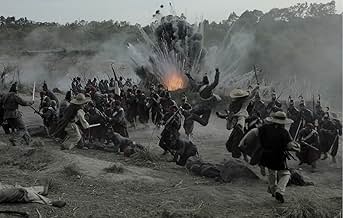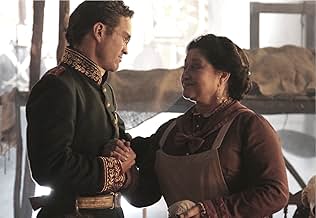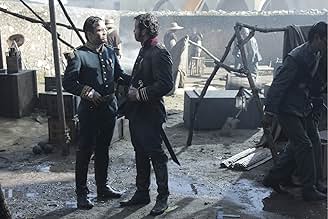El 5 de mayo de 1862, unos pocos miles de soldados mexicanos arriesgaron sus vidas contra el ejército más grande y poderoso del mundo en una legendaria batalla por la libertad y por México.El 5 de mayo de 1862, unos pocos miles de soldados mexicanos arriesgaron sus vidas contra el ejército más grande y poderoso del mundo en una legendaria batalla por la libertad y por México.El 5 de mayo de 1862, unos pocos miles de soldados mexicanos arriesgaron sus vidas contra el ejército más grande y poderoso del mundo en una legendaria batalla por la libertad y por México.
- Premios
- 3 premios y 2 nominaciones en total
Christian Vazquez
- Juan Osorno
- (as Christian Vázquez)
Kuno Becker
- General Ignacio Zaragoza
- (as Kuno Bécker)
J.C. Montes-Roldan
- Teniente Fauvet
- (as Jose Carlos Montes Roldán)
Álvaro García
- Dubois de Saligny
- (as Álvaro García Trujillo)
Pablo Abitia
- General Ignacio Mejía
- (as Juan Pablo Abitia)
Argumento
¿Sabías que...?
- CuriosidadesPorfirio Díaz, who plays a prominent supporting role in the battle, would later serve as president of Mexico from 1877-1880 and again in 1884-1911, ultimately being forced to resign and go into exile by Mexican revolutionary forces.
- PifiasIn 1863, Profirio Diaz wasn't a General, he was Liuetenant. He became general in 1867.
Reseña destacada
First off, I am a history buff and I always loved history when I was a young boy. I look at what battles changed history and which battles were a turning point that forced the losing side to sign a treaty to end a war. And Cinco de Mayo is no exception. The movie shows how we celebrate Cinco de Mayo every year. So, here is what happened. Mexico was bankrupt after The Reform War from 1857 to 1861 when the Conservatives, who were unhappy with the results of the election, decided to revolt against the Liberals. In 1861, when the Liberals won the war, Benito Juárez was brought back in as Mexico's President. However, this war ruined Mexico's economy and they were bankrupt. So President Benito Juárez signed a 2 year suspension of its loans. However, the news did not sit well with France, the United Kingdom, and Spain. And when they heard Mexico suspend its loans, they were angry about this. So on October 31st, 1861, France, Britain, and Spain signed the Convention of London to intervene in Mexico and to pay the unpaid debt. It lead the 3 countries to put pressure on Mexico through naval blockade. Although the British and Spanish governments had limited plans for intervention, Napoleon the III wanted to overthrow the Mexican government and to put a French monarch in the Western Hemisphere. But when England and Spain heard about France's intentions, they withdrew support. And with the United States unable to use its Monroe Doctrine to stop any country from colonizing, Napoleon believed that Mexico was too weak for its superior army because the French Army was the best around that time and the time was now. So, in 1862, about 6,000 French troops under the command of Charles de Lorencez, landed in Veracruz and headed towards Mexico City. But a surprise was waiting for the French. Mexican General Ignacio Zaragoza, had a army of around 4,500 soldiers in Fort Loreto and Fort Guadalupe, just outside the city of Puebla. On May 5th, 1862, Cinco de Mayo, the French Army arrived and started attacking the forts. However, to Lorencez's fury, the old stone forts held firm against his cannons. So he ordered an all-out attack against the Mexicans. However, the first attack was repulsed with heavy losses. So Lorencez ordered a second attack, bolstering its numbers by committing his reserves and orchestrated a diversionary attack on the eastern part of the city. Both attacks were initially successful than the first attack, but it was repulsed as well. Nevertheless, De Lorencez ordered a third attack, an ill-fated one as his artillery was out of ammunition. It was a complete disaster. Now it was Zaragoza's turn. It's the climatic counter-attack you've been waiting for with the French being attacked on both flanks by Zaragoza's cavalry and then charged head on by the infantry. The battle lasted from daybreak to early evening and when the French finally retreated, they had lost nearly 500 soldiers. Fewer than 100 Mexican soldiers were killed in the battle. Although it was not a major strategic victory, the Mexican victory, led by Texas-born General Ignacio Zaragoza on Cinco de Mayo, represented a great symbolic victory for the Mexican people and empowered the resistance movement. Because of that, the City of Puebla was renamed Puebla de Zaragoza. However, the story doesn't end there. After the French were defeated, they regrouped and Napoleon sent 30,000 more troops to Mexico. Did you know there were 2 Battles of Puebla? The first one was a Mexican Victory, however, the second battle was a siege, not a battle. After a grueling two month siege, the Mexicans were forced to surrender. By June 1863, the French emerged victorious and captured Mexico City. Forced to leave the capital, President Juárez kept his government alive by a long series of retreats that ended at El Paso de Norte, which was later renamed Juárez at the United States/Mexico Border. With the French occupying Mexico City, the Second Mexican Empire was established with the support of Napoleon the III. The provisional government offered the crown to the Austrian Archduke, Maximilian of Habsburg. Napoleon convinced Maximilian that Mexico had authorized his appointment. In fact, a mockery of a referendum had been staged with not a single vote cast against him. Under the banner of the Second Mexican Empire, Maximilian and his wife Charlotte, looked forward to their new home and were led to believe their presence would be welcomed. They set sailed for Mexico and received a cold reception from the townspeople. Maximilian the I was crowned Emperor on April 10th, 1864. To the surprise of many, he pushed for laws to prohibit child labor, established a limit to working hours, and abolished a system of land tenancy that virtually amounted to serfdom. However, the French were still occupiers and the Mexicans continued to fight them. By 1866, the Mexicans were winning more battles and with the end of the American Civil War, the United States were finally in a state to help its neighbor. Not wanted to start a war with the U. S. A, the French finally withdrew. Maximilian was captured and in the controversial decision, later executed by firing squad, with two of his generals. In June 1867, Benito Juárez reclaimed the presidency and proclaimed the 5th of May, the anniversary of the Battle of Puebla, would be a national holiday. Today, Cinco de Mayo is actually more celebrated in the United States than in Mexico. In fact, the world's biggest Cinco de Mayo party is held in Los Angeles, California, but the unlikely win for the Mexican militia on May 5th, continues to be a source of great pride for the state of Puebla and to the United States of America.
The Battle of Puebla is of more significance to the US than many people realize. At that time, the American Civil War was at its height, and Union forces were stretched to their limits. France, under Napoleon III, wanted to support the South, in an attempt to tear the US apart by possibly reclaiming the Louisiana Territory. The Battle of Puebla, however, changed all that. By the time the French was able to send more troops, the Battle of Gettysburg had broken the back of the Confederacy, thereby showing the French that the Confederates were in no position to be the kind of trading partners that they and other imperialist governments in Europe were looking for. Once the Civil War ended, Lincoln and Johnson openly sent aid to the Mexican troops, thus putting the kibosh on the arrogant Louis Napoleon's schemes once and for all. The Mexican people have repaid our nation for its assistance many time over by the enlistment of many native Mexicans in the American Army--in the First World War, the Second World War, and succeeding conflicts all the way up to the First Gulf War. In other words, if the native Mexicans had lost the Battle of Puebla, it is quite possible that the United States as we know it today might not even exist!
The Battle of Puebla is of more significance to the US than many people realize. At that time, the American Civil War was at its height, and Union forces were stretched to their limits. France, under Napoleon III, wanted to support the South, in an attempt to tear the US apart by possibly reclaiming the Louisiana Territory. The Battle of Puebla, however, changed all that. By the time the French was able to send more troops, the Battle of Gettysburg had broken the back of the Confederacy, thereby showing the French that the Confederates were in no position to be the kind of trading partners that they and other imperialist governments in Europe were looking for. Once the Civil War ended, Lincoln and Johnson openly sent aid to the Mexican troops, thus putting the kibosh on the arrogant Louis Napoleon's schemes once and for all. The Mexican people have repaid our nation for its assistance many time over by the enlistment of many native Mexicans in the American Army--in the First World War, the Second World War, and succeeding conflicts all the way up to the First Gulf War. In other words, if the native Mexicans had lost the Battle of Puebla, it is quite possible that the United States as we know it today might not even exist!
- MexicoIgnacioZaragoza16
- 3 jun 2021
- Enlace permanente
Selecciones populares
Inicia sesión para calificar y añadir a tu lista para recibir recomendaciones personalizadas
- How long is Cinco de Mayo, La Batalla?Con tecnología de Alexa
Detalles
- Fecha de lanzamiento
- País de origen
- Sitio oficial
- Idiomas
- Títulos en diferentes países
- Cinco de Mayo, La Batalla
- Empresas productoras
- Ver más compañías en los créditos en IMDbPro
Taquilla
- Presupuesto
- 10.000.000 US$ (estimación)
- Recaudación en Estados Unidos y Canadá
- 173.472 US$
- Fin de semana de estreno en EE. UU. y Canadá
- 83.586 US$
- 5 may 2013
- Recaudación en todo el mundo
- 2.794.852 US$
- Duración2 horas 5 minutos
- Color
Contribuir a esta página
Sugerir un cambio o añadir el contenido que falta

Principal laguna de datos
By what name was Cinco de Mayo: La batalla (2013) officially released in India in English?
Responde


































